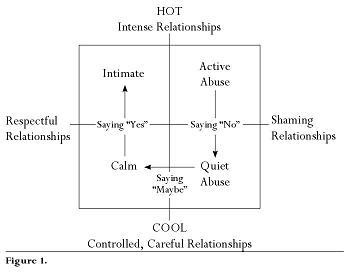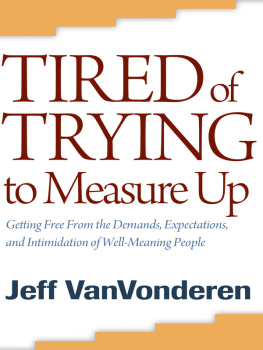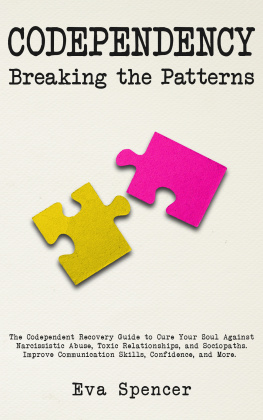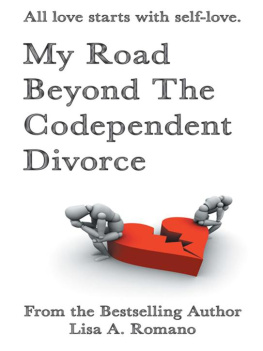W e want to express our gratitude to James Ryan, without whose assistance this book never would have been written. We are grateful also to Barbara Milligan and Cindy Bunch for helpful suggestions on early versions of the manuscript. Additional thanks to Robin and Nancy Wainwright, David Johnson, Peter Ryan, Dale Wolery, Cindy Evans, Genya Simonian and Mary Rae. We would be remiss not to acknowledge the enormous debt we owe to hundreds of people who have shared their stories with us in our roles as pastors, therapists and educators. To each of you we want to express our gratitude for your courage, your honesty and your trust; you have taught us a lot. It is our hope that through this book some of what you have taught us will benefit others. Finally, we want to thank the friends, counselors and spiritual partners who have offered us care and help through the years. Your love and support have been a vital part of our experience of grace.
6

Beginning to Rebuildy
Unless the Lord builds the house,
its builders labor in vain.
Psalm 127:1
W e are now ready to outline a blueprint for rebuilding our spiritual lives. By blueprint we mean a general plan for rebuilding; the specifics of the rebuilding process will vary significantly from person to person. The blueprint begins with the recognition that we need to tear up our old foundation and get to work on a new onein other words, we focus first and foremost on rebuilding our relationship with God. So we begin by asking what kind of relationship we plan to build.
We are convinced that all of us long for a relationship with Goda relationship characterized by intimacy and loving respect. We are convinced that this longing is hard-wired into us. It is part of who we are. Perhaps these longings are buried and unconscious, but they are there. We do not want an abusive relationship with God, nor do we want a distant relationship with God. We long for the security, connectedness and closeness that can come only from an intimate relationship with God. Fortunately, even a casual reading of the Bible suggests that this is precisely the kind of relationship God wants to have with us. The problem is that those of us who are experiencing the kinds of destructive spirituality that is described in the previous chapters of this book must face the fact that our relationship with God is not an intimate one; it is not characterized by either closeness or respect. Many of us must begin the process of rebuilding our spiritual lives by recognizing that our relationship with God is best characterized as either an actively or quietly abusive relationship, because we have been serving gods-who-are-not-God. These not-Gods have been abusive, neglectful, distant and shaming. If this is the case, the central question for us is this: how can we move from an abusive relationship with a god-who-is-not-God to an intimate relationship with the true and living God? Thats what we want, and thats what the God revealed in Scripture wants as well.
To understand this blueprint for rebuilding our spiritual lives, we have found it helpful to look at a grid that illustrates some distinct types of relationships. We are indebted here to Merle A. Fossum and Marilyn J. Mason, whose book Facing Shame: Families in Recovery emphasizes two key qualities of relationships. First, all relationshipsincluding our relationship with Godfall somewhere on a continuum between hot relationships and cool relationships (see fig. 1). By hot relationships we mean close, engaged, face-to-face relationships. By cool relationships we mean controlled, cautious, limited relationships. Second, all relationships fall somewhere on a continuum between respectful and shaming relationships. In respectful relationships, each party treats the other as a valued person, whereas in shaming relationships, one or both parties devalue the other in some way.

When we put these two qualities together, we can distinguish between four distinct kinds of relationships.
Actively abusive relationships . A relationship that is hot and is characterized by shame is what we call an actively abusive relationship. If we were talking about domestic violence, this would be the kind of relationship likely to result in physical bruises and broken bones in addition to psychological and spiritual trauma. Both the intensity and the shame are very high.
Quietly abusive relationships. It is also possible to have a relationship that is shaming but cool. We call this a quietly abusive relationship. Taking domestic violence again as an example, a quietly abusive relationship would not involve bruises and broken bones, but it would still cause the kinds of damage that come from shame. The intensity is reducedalmost certainly a good thing in the case of violent relationshipsbut the level of shame is still very high.
Calm relationships. A relationship that is cool but is also high in respect is what we call a calm relationship. It may not be an intimate relationship, but because the shame is low and the respect is high, it can offer many benefits, such as safe companionship.
Intimate relationships. Intimate relationships are hot (close, deeply connected) and profoundly respectful, which is a powerful combination. All of us gravitate, when we feel it is safe to do so, in the direction of increased intimacy. We long to be deeply known, understood and loved. And we also long to know others deeply, to understand them and to love them. This is possible only in relationships that are both respectful and very close.
So how does our relationship with God fit into this pattern? Those of us who have found some elements of active abuse in our relationship with God long for that relationship to become both hot (close) and respectful. It would be great if we could just move directly, in a single step, from an actively abusive relationship to an intimate one. Since both kinds of relationships are hot, maybe it would work to just remove the shame in the relationship and replace it with respect. While such a transition might be possible in theory, all our experience suggests that there is no way to do this. Again using the analogy of domestic violence, a physically abused spouse often experiences times of deep longing for the return of intimacyand may often attempt to make this one-step transformation. But the results are unfortunately predictable. The attempt to shift quickly to an intimate relationship turns out to be just another stage in the cycle of abuse. It may briefly seem that a transformation has taken place and intimacy has returned, but sooner or later the same old abusive dynamics take over.
After a few trips around this cycle, we learn that in our efforts to make a quick, one-step escape from abuse into intimacy we must have overlooked some important steps in the healing process. And that is exactly the problem. We cant move directly from an abusive relationship to an intimate one. The blueprint we are proposing in this chapter involves three essential stages in the journey from an abusive relationship to an intimate relationship. We call these stages (1) the No stage, which is when we tear out our old, flawed foundation, (2) the Maybe stage, when we start building a new foundation, and (3) the Yes stage, when our foundation in a new relationship with God begins to support the weight of a new spiritual life.
In the first stage we say no to the gods-who-are-not-God, so that we can remove our faulty foundation. If we serve a god-who-is-not-God, a god who does not deserve our worship and service, we need to fire this god. The No stage reduces the intensity of the relationship, and this cant be avoided, because things need to calm down. We have to stop the active abusethe bruises, the broken bonesbefore we can move on. In the Maybe stage we begin to explore the possibility of a more respectful relationship with God. This stage allows to us to gradually decrease the shame we experience in our relationship with God and helps us begin to experience Gods love for us. And, finally, after weve spent time building trust during the Maybe stage, we find ourselves ready to begin to say yes to a more intimate relationship with God.












